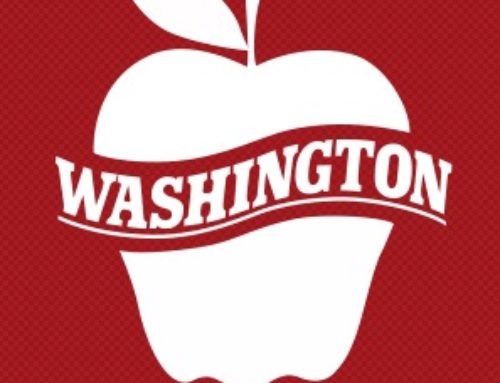Sean Gilbert of Gilbert Orchards testified before the U.S. House Agriculture Committee’s subcommittee on Biotechnology, Horticulture and Research in support of the 2018 Farm Bill. He agreed to share his testimony with readers of Good Fruit Grower.

Sean Gilbert
Today, I am representing my family’s fruit business that’s been farming in the Yakima Valley of Washington state since 1897, growing apples, cherries, pears and wine grapes.
I am also representing a broad community of fruit farmers and their employees, in our state and across the country, who share a common interest in continuing to produce delicious, healthy, safe, American-grown fruit for generations to come.
The Pacific Northwest is home to many family-owned orchards that provide approximately two-thirds of the apples and about three-fourths of the pears and sweet cherries grown in the United States.
Together, these crops are valued at over $3 billion annually, with about one-third of the value coming through foreign trade, and create tens of thousands of jobs.
Like all farming, tree fruit production is an inherently risky business, where the whims of weather, pests and disease can decimate an entire year’s crop.
Through crop insurance programs funded by the Farm Bill that fill in where private sector insurance comes up short, growers are able to confidently reinvest in modern orchards that are better for our employees and our customers and out-compete the other fruit growing regions of the world.
A number of research programs funded through the Farm Bill have yielded critical new tools for tree-fruit growers and warrant continued or enhanced support.
I’d like to highlight two great stories that resulted from federally funded research:
—The ARS laboratory in Wapato, Washington, has given growers new methods to combat awful pests like codling moth and apple maggot that can destroy fruit in one orchard and jeopardize export markets for the entire industry. My dad, Cragg, who was an early adopter of organics, says simply, “Organic farming in Washington would not be possible without ARS in Wapato.”
—Also, a project partially funded by a Specialty Crop Research Initiative grant led to the development of a vision system that is a critical piece of the most promising automated harvester for fresh apples we have ever seen.
Before I move on to other issues, I want to note that tree fruit growers do not expect taxpayers to fund all of our research needs.
Our state’s growers have paid annual assessments to fund research since 1969 and, in 2013, we voted to impose an additional assessment to fund a $32 million endowment at Washington State University to support new research. Together we are leveraging these public and private dollars to make sure American apples, pears and cherries are the most sought after in the world.
I would also like to highlight the value of the Clean Plant Network. The Clean Plant Center located in Prosser, Washington, has played a vital role in the maintenance and distribution of virus-free, tree fruit material that encourages us to invest in new orchards with confidence.
Another area I would like to address is organic production, which is close to my heart personally and has become a vital part of our industry.
My family has embraced organic practices throughout our organization, giving us more ecologically diverse orchards while giving consumers the right to choose how their fruit is grown.
The membership requirements and appointment process for the National Organics Standards Board have not been reviewed since the board was first created in 1990.
The makeup of the organic industry has changed substantially since then, and I ask that the subcommittee work with stakeholders to ensure the makeup of the NOSB better represents the organic industry producers and consumers.
I believe this is a needed step in ensuring that organic practices have the widespread impact on American agriculture they deserve while meeting ever growing consumer demand.
Another area of increasing concern to me is the Food Safety Modernization Act. Let me be clear, our industry is committed to producing the safest possible fruit for consumers; however, two areas of regulation in particular are unreasonable and not based on risk: the water testing requirements and the definition for packinghouses that regulates differently based on size, not risk.
I am pleased that FDA Acting Commissioner Stephen Ostroff informed us that the agency recognizes these problems and is reconsidering the language on these issues. I ask the subcommittee to support efforts to ensure that FDA provides solutions that are risk-based and reasonable to implement.
While it does not fall under this subcommittee’s jurisdiction, I also would like to highlight the Market Access Program (MAP), which, through a 2016 study, showed a remarkable $24 in export gains for every additional $1 spent on foreign market development. Given the clear effectiveness of the program, I believe that MAP funding should be increased to $400 million annually.
Lastly, I would like to address the need for a stable, legal agricultural workforce. The bottom line is that the H-2A program is insufficient for meeting the needs of our growers, and it disproportionately hurts small farmers.
We need a guest worker program that is affordable, reliable and reasonable, and a solution that provides a pathway to legal status for the current workforce so that this expertise is not lost.
The culture of fear that looms over our immigrant population puts at risk our industry’s ability to supply the best tasting, safest produce in the world, grown in America. I encourage bold, effective action to address this issue. •
Sean Gilbert is general manager of Gilbert Orchards. He testified on March 9 at the behest of the Northwest Horticultural Council. Kate Woods, the council’s vice president, assisted with these remarks.






Another area of the FSMA is apparently a loophole was left in the alcoholic beverage producers exemption. The FDA is enforcing food processing oriented GMP’s (Good [aka Governemnt] Manufacturing Practices) in inspections based on the Bioterrorism Act of 2003. If they have this nonsense the exemptions are just useless formality. Wine outright kills human pathogens and there has been no history of food safety issues in US producers of alcoholic beverages. We are well regulated as to materials and procedure used in production by the TTB (formerly BATF). Duplicate and excessive over regulation is superfluous and unnecessary. Also, it violates some established traditional wine making principles. Ohio has similar licensing and regulation as do some states. Reasonable states like Washington seem to exempt wineries and breweries from being regulated as food processors. If I have to as a small producer need to apply any of this to my artisan craft I will just go out of business. Government is getting more destructive in its desire to control every tiny facet of our lives. Governments are in place to ensure freedom and protect liberties and it is becoming the polar opposite of that.
thanks for sharing the knowledge, will help a lot.
great content, I really enjoyed reading ii.